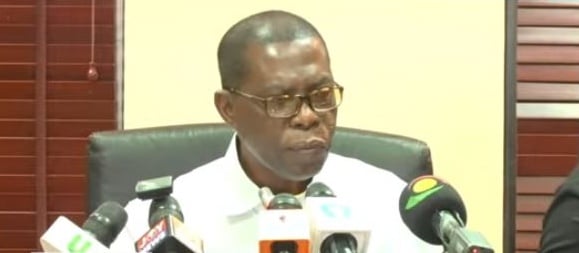The Minority Caucus on Food, Agriculture, and Cocoa Affairs in Ghana has launched a vehement critique of the government’s newly announced farm gate price for cocoa for the 2025/2026 season. Set at GH₵3,228.75 per 64-kilogram bag, the price represents a meager 4.2 percent increase from the previous season’s GH₵3,100.00. The Minority contends that this marginal increment is a gross inadequacy that threatens the livelihoods of cocoa farmers nationwide, characterizing it as a “Sakawa price,” a term implying deceitful and exploitative practices. They argue that the new price is economically unjustifiable and morally indefensible, especially given the backdrop of escalating global cocoa prices. This constitutes a betrayal of the farmers who have historically been the backbone of Ghana’s economy. The Minority’s condemnation stems from a perceived disparity between the government’s current stance and the promises made during the 2024 election campaign.
The Minority Caucus has highlighted the stark contrast between the current cocoa price and the assurances given by prominent government officials during the election campaign. They recall promises made by then-opposition figures, including the current Agriculture Minister, Eric Opoku, and Finance Minister, Dr. Cassiel Ato Forson, who pledged farm gate prices of GH₵6,000 and GH₵7,000 per bag, respectively, should their party, the National Democratic Congress (NDC), come to power. The Caucus argues that the current price of GH₵3,228.75 represents a broken promise and a significant betrayal of the trust placed in the government by cocoa farmers. This perceived discrepancy between campaign rhetoric and actual policy has fueled the Minority’s outrage and accusations of deception. They argue that the government’s failure to deliver on these promises not only undermines the farmers’ economic well-being but also erodes public trust in the government’s commitment to the agricultural sector.
Adding to the Minority’s concerns is the comparison with neighboring Côte d’Ivoire’s farm gate price. While COCOBOD’s Chief Executive had previously suggested that Ghana’s price would surpass that of its neighbor, the reality is starkly different. Ivorian farmers are reportedly receiving the equivalent of GH₵3,635 per bag – a significant GH₵407 more than their Ghanaian counterparts. This price disparity, the Minority warns, is likely to exacerbate cross-border smuggling of cocoa, further destabilizing the local cocoa trade and depriving Ghana of valuable revenue. The Minority argues that this situation underscores the government’s flawed pricing model and its failure to adequately protect the interests of Ghanaian cocoa farmers, potentially leading to further economic hardship and social unrest within the cocoa-growing communities.
Furthermore, the Minority criticizes the government for failing to adhere to President Akufo-Addo’s 2020 commitment to ensure farmers receive at least 70 percent of the Free on Board (FOB) price. With global cocoa prices reaching $12,000 per metric ton, the Minority calculates that Ghanaian farmers should be receiving a minimum of GH₵3,718 per bag – a substantial GH₵489 more than the current price. This shortfall, they argue, demonstrates a disregard for the President’s own directive and further exacerbates the economic injustice faced by cocoa farmers. They demand transparency and accountability from the government, urging them to honor their commitments and ensure a fair and equitable distribution of cocoa revenues.
Beyond the immediate pricing concerns, the Minority demands greater transparency regarding the management of cocoa revenues from the 2024/2025 season. They call for a full disclosure of all financial transactions, including transfers, grants, and other cocoa-related support received in 2025. This demand for transparency stems from suspicions of mismanagement and a lack of accountability within the cocoa sector. The Minority also alleges deceptive practices in the distribution of farming inputs, claiming that fertilizers and insecticides marketed as “free” are actually being deducted from the FOB price, further diminishing farmers’ income. These concerns, if substantiated, paint a picture of systematic exploitation within the cocoa industry, with farmers bearing the brunt of opaque financial practices and hidden costs.
The Minority Caucus paints a bleak picture of mounting disillusionment among cocoa farmers, with some reportedly considering abandoning cocoa farming for illegal mining – a dangerous and environmentally destructive activity – as a more viable means of survival. This stark warning underscores the severity of the situation and the potential for widespread social and economic consequences if the government fails to address the concerns of cocoa farmers. They urge the government to take immediate action to review the farm gate price, fulfill its campaign promises, implement a fair and transparent pricing policy, and restore trust and confidence within the cocoa sector. The Minority’s concluding message is a dire warning: the sustainability of Ghana’s cocoa industry, a cornerstone of the national economy, hangs in the balance. The government must act decisively to avert a potential crisis and ensure the long-term well-being of Ghana’s cocoa farmers.


